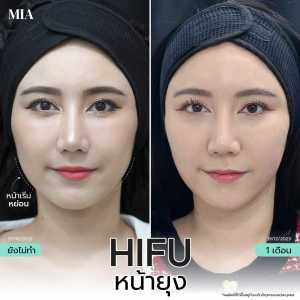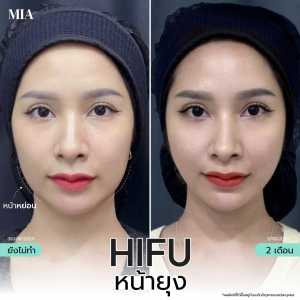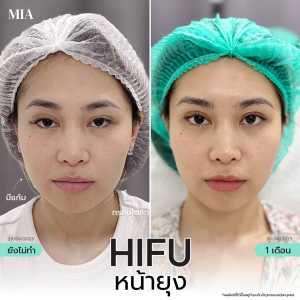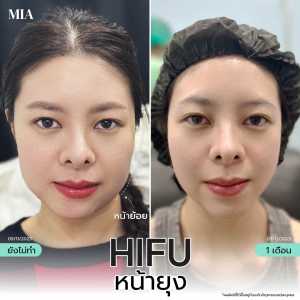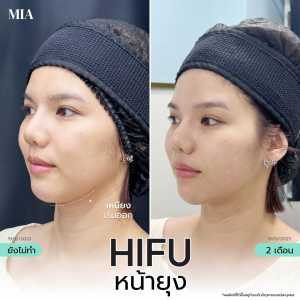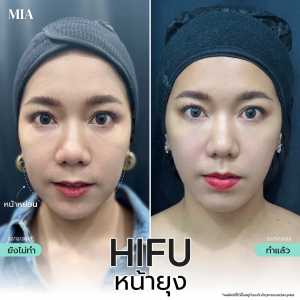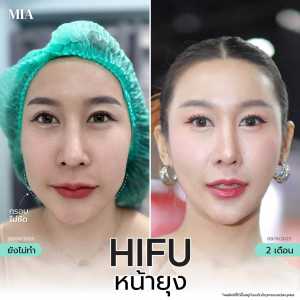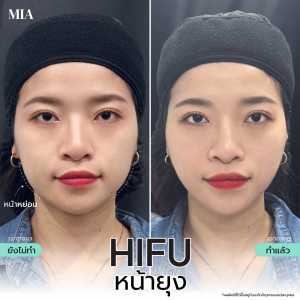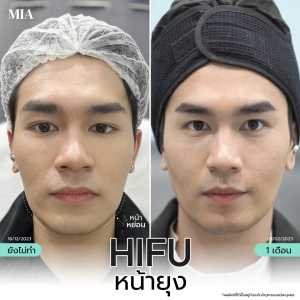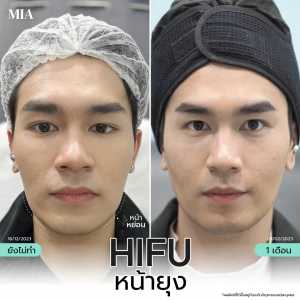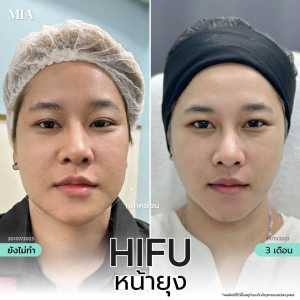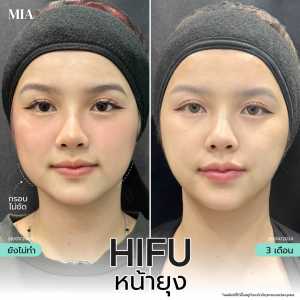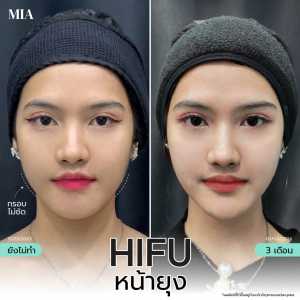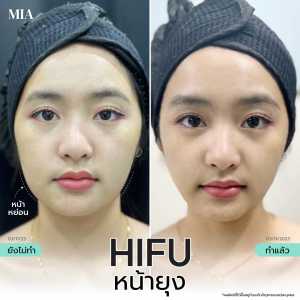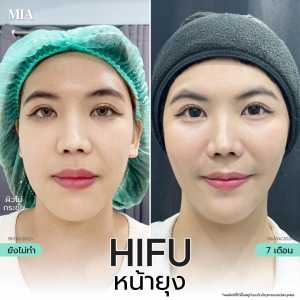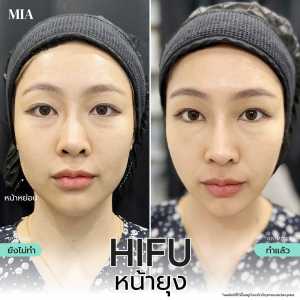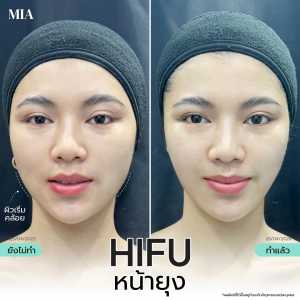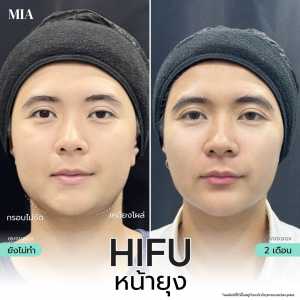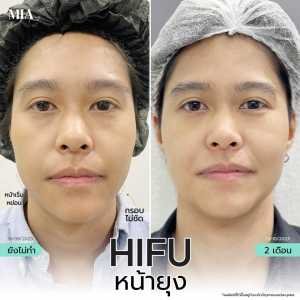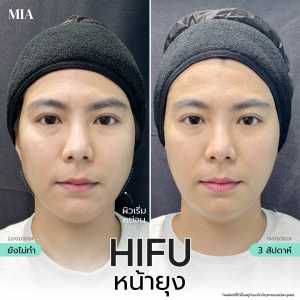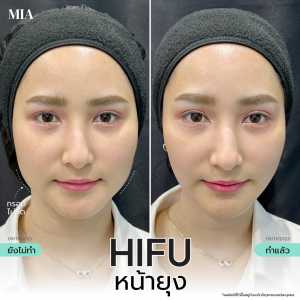Introduction to Hifu Treatment Program :
Welcome to Mia Surgery Clinic, where we specialize in advanced non-invasive treatments tailored to enhance your natural beauty. One of our premier offerings is the revolutionary Hifu Treatment Program, designed to rejuvenate and tighten your skin, providing a youthful and radiant appearance.
What is Hifu Treatment Program?
Hifu, or High-Intensity Focused Ultrasound, is a cutting-edge procedure that utilizes focused ultrasound energy to target deep layers of the skin without harming the surface. This non-surgical approach stimulates the production of collagen, resulting in firmer, tighter skin and a more youthful complexion.
The Quest for the V-Shaped Face:
In today's beauty landscape, achieving a V-shaped face has become a coveted aesthetic goal. With Hifu, you can sculpt and contour your facial features, defining your jawline and lifting sagging skin to create a harmonious and elegant profile.
Why Choose Hifu?
Unlike traditional surgical facelifts, Hifu offers numerous benefits, including:
Non-Invasive: Hifu treatment requires no incisions or anesthesia, minimizing discomfort and downtime.
Natural Results: By stimulating collagen production, Hifu produces gradual and natural-looking improvements in skin tightness and texture.
Long-Lasting Effects: Enjoy the benefits of Hifu for months to come, with results that continue to improve over time.
Tailored Solutions for Your Unique Beauty Needs:
At Mia Surgery Clinic, we understand that every individual is unique. That's why our Hifu Treatment Program is customized to address your specific concerns and goals, ensuring optimal results that complement your natural beauty.
Embark on your journey to radiant skin and a rejuvenated appearance with our Hifu Treatment Program at Mia Surgery Clinic. Discover the transformative power of Hifu and unlock the secret to a youthful, V-shaped face.
Next, let's delve into the details of the Hifu treatment program with a comprehensive table of contents.
Table of content

How Does It Work?
Hifu treatment harnesses the power of focused ultrasound energy to penetrate deep beneath the skin's surface, targeting specific layers with precision. Unlike other treatments that primarily address superficial skin concerns, Hifu reaches depths where collagen production occurs.
Here's a breakdown of how Hifu works:
1. Focused Ultrasound Energy: The Hifu device emits high-intensity ultrasound waves that converge at a focal point beneath the skin. This focused energy generates heat, stimulating thermal coagulation points within the skin's layers.
2. Stimulation of Collagen Production: The controlled heating triggers a natural wound healing response in the body, leading to the production of new collagen fibers. Collagen is a crucial protein responsible for maintaining skin firmness and elasticity.
3. Tissue Tightening and Lifting: As collagen production increases, the skin undergoes gradual tightening and lifting effects. This results in improved skin texture, reduction of wrinkles, and a more youthful appearance.
4. Precision and Safety: One of the key advantages of Hifu is its ability to precisely target specific areas beneath the skin without affecting the surrounding tissues. This ensures both safety and efficacy during the treatment process.
By harnessing the body's natural regenerative processes, Hifu offers a non-invasive solution for addressing skin laxity and aging concerns, providing noticeable results without the need for surgery or downtime.
Where on the face can
Hifu treatment be done ?
Hifu treatment can be administered to various areas of the face, targeting specific concerns and areas of skin laxity. This innovative procedure is versatile and can effectively address multiple facial regions, including:
- Forehead: Targeting forehead wrinkles and lines for a smoother appearance.
- Eyebrows: Lifting sagging eyebrows and reducing hooded eyelids.
- Cheeks: Tightening and firming sagging cheeks for a more youthful contour.
- Jawline: Defining the jawline and reducing the appearance of jowls.
- Chin: Improving the definition of the chin and reducing double chin appearance.
- Neck: Firming and tightening loose skin on the neck, reducing the appearance of neck wrinkles and sagging.
With its ability to target specific areas of concern, Hifu treatment offers comprehensive facial rejuvenation, helping individuals achieve a more youthful and refreshed appearance.

Who Is Suitable for Hifu Treatment?
Hifu treatment is suitable for individuals who are experiencing mild to moderate skin laxity and wish to improve the firmness and tightness of their skin without undergoing surgery. Ideal candidates for Hifu treatment typically exhibit the following characteristics:
1. Mild to Moderate Skin Laxity: Individuals with mild to moderate sagging or loose skin on the face, neck, or décolletage are prime candidates for Hifu treatment. This may include concerns such as sagging jowls, drooping eyebrows, or loss of jawline definition.
2. Desire for Non-Invasive Treatment: Hifu is an appealing option for those seeking non-surgical alternatives to traditional facelift procedures. Candidates should be interested in achieving noticeable improvements in skin tightening and rejuvenation without the need for incisions or anesthesia.
3. Good Overall Health: Candidates for Hifu treatment should be in good general health and free from any underlying medical conditions that may contraindicate the procedure. It is essential to disclose any medical history or current medications to your healthcare provider before undergoing treatment.
4. Commitment to Skincare: Maintaining healthy skincare habits before and after Hifu treatment can enhance results and prolong the longevity of benefits. Candidates should be willing to follow post-treatment care instructions provided by their healthcare provider to optimize outcomes.
By meeting these criteria, individuals can determine whether Hifu treatment is the right option for their unique needs and goals, paving the way for a more youthful and rejuvenated appearance without surgery.
Pros of Hifu:
1. Non-Invasive Nature: Hifu treatment is non-surgical, eliminating the need for incisions or anesthesia. This reduces the risk of complications and shortens recovery time compared to traditional surgical procedures.
2. Natural-Looking Results: By stimulating the body's natural collagen production, Hifu produces gradual improvements in skin tone and texture. This leads to results that appear natural and enhance the overall appearance without looking overdone.
3. Minimal Downtime: Unlike surgical facelifts, which often require weeks of downtime for recovery, Hifu treatment allows patients to resume their normal activities immediately after the procedure. There is minimal discomfort and swelling, allowing individuals to return to their daily routines with little interruption.
4. Longevity of Results: While individual experiences may vary, many patients enjoy long-lasting results from Hifu treatment. The stimulated collagen production continues to improve skin tightness and firmness over time, with results lasting for several months to a year or more.
5. Versatility: Hifu treatment can be tailored to address specific concerns and areas of the face, making it a versatile option for facial rejuvenation. Whether targeting sagging jowls, fine lines, or overall skin tightening, Hifu can be customized to meet individual needs effectively.
6. Safe and FDA-Approved: Hifu technology has been approved by the FDA for use in cosmetic procedures, ensuring its safety and efficacy. With proper training and adherence to protocols, Hifu treatment is considered a safe option for facial rejuvenation.
7. No Need for Anesthesia: Unlike surgical procedures that require anesthesia, Hifu treatment typically does not necessitate the use of anesthesia. This reduces the risks associated with anesthesia-related complications and eliminates the need for post-anesthesia recovery.
In summary, Hifu treatment offers numerous advantages, including its non-invasive nature, natural-looking results, minimal downtime, longevity, versatility, safety, and gradual improvement over time. These benefits make it a popular choice for individuals seeking effective facial rejuvenation without the drawbacks of surgery.

Aftermath of Hifu Treatment:
Following Hifu treatment, individuals may experience some common effects as part of the healing process. Understanding these potential outcomes can help individuals prepare for what to expect and optimize their post-treatment care. Here's what to anticipate after undergoing Hifu treatment:
1. Temporary Redness: It is normal to experience mild to moderate redness in the treated area immediately after Hifu treatment. This redness typically resolves within a few hours to a day but may persist for up to a few days in some cases.
2. Slight Swelling: Some individuals may notice mild swelling in the treated area, which can occur due to the energy delivered during the Hifu procedure. Swelling is usually temporary and subsides within a few days as the body's natural healing process takes place.
3. Tingling Sensation: A tingling or prickling sensation may be experienced in the treated area, which is a result of the ultrasound energy stimulating collagen production beneath the skin's surface. This sensation is typically mild and transient.
4. Rare Side Effects: While uncommon, some individuals may experience rare side effects such as bruising, numbness, or tenderness in the treated area. These side effects are usually mild and resolve on their own within a short period.
5. Immediate Results: While full results may take several weeks to manifest as collagen remodeling occurs, some individuals may notice immediate improvements in skin tightness and texture following Hifu treatment. These initial results serve as a promising indication of the ultimate outcome.
Does Hifu Hurt?
One of the notable advantages of Hifu treatment is its relatively low discomfort level compared to invasive surgical procedures. However, individual pain tolerance varies, and some individuals may experience mild discomfort during the procedure. Here's what to consider regarding pain and discomfort associated with Hifu treatment:
1. Sensation of Heat: During Hifu treatment, individuals may experience a sensation of heat as the focused ultrasound energy penetrates the skin's deeper layers. This heat is essential for stimulating collagen production and achieving the desired skin tightening effects.
2. Tingling or Prickling Sensation: Some individuals may perceive a tingling or prickling sensation in the treated area, which is a common response to the ultrasound energy. This sensation is typically mild and tolerable for most individuals.
3. Topical Anesthesia: To minimize discomfort, some healthcare providers may apply a topical numbing cream to the treatment area before initiating Hifu treatment. This numbing cream helps to alleviate any potential discomfort during the procedure.
4. Immediate Discomfort: While discomfort during Hifu treatment is generally minimal, individuals with heightened sensitivity or specific areas of concern may experience temporary discomfort. It is essential to communicate any discomfort to your healthcare provider during the procedure so that adjustments can be made as needed.
Before and Aftercare of Hifu:
Before Hifu Treatment:
1. Consultation: Schedule a consultation with your healthcare provider to discuss your goals, medical history, and suitability for Hifu treatment. Use this opportunity to ask any questions and address concerns you may have about the procedure.
2. Avoid Sun Exposure: Minimize sun exposure and use sunscreen with a high SPF to protect your skin from UV damage. Sunburned or tanned skin may be more sensitive to Hifu treatment.
After Hifu Treatment:
1. Follow Post-Treatment Instructions: Adhere to any post-treatment instructions provided by your healthcare provider, including skincare recommendations, activity restrictions, and guidelines for managing potential side effects.
2. Avoid Sun Exposure: Protect your skin from direct sunlight and avoid prolonged sun exposure for at least a week following Hifu treatment. Apply sunscreen regularly and wear protective clothing when outdoors to prevent UV damage.
3. Monitor for Side Effects: Keep an eye out for any unusual side effects such as excessive redness, swelling, or discomfort in the treated area. Contact your healthcare provider if you experience any concerning symptoms or if side effects persist.

Other Treatments That Can Be Done to Complement Hifu:
1. Dermal Fillers: Dermal fillers are injectable treatments used to restore volume, smooth wrinkles, and enhance facial contours. Combining Hifu with dermal fillers can address signs of aging such as volume loss and deep lines, providing a more youthful and balanced appearance.
2. Botullinum toxin program: Neurotoxin injections such as Botullinum can complement Hifu by targeting dynamic wrinkles caused by repetitive muscle movements. These injections relax facial muscles, reducing the appearance of lines and wrinkles for a smoother complexion.
3. Micro-needling: Micro-needling involves creating microscopic punctures in the skin to stimulate collagen production and improve skin texture. When combined with Hifu, micro-needling can further enhance skin tightening and address concerns such as acne scars and uneven skin tone.
4. Laser Skin Resurfacing: Laser skin resurfacing treatments target specific skin concerns such as fine lines, wrinkles, and sun damage. When used in conjunction with Hifu, laser treatments can further improve skin texture, tone, and pigmentation for comprehensive rejuvenation.
Can You Get Facial Treatment Right After Hifu?
After undergoing Hifu treatment, it's essential to allow your skin time to heal and adjust before considering additional facial treatments. While Hifu is generally well-tolerated and minimally invasive, it's crucial to avoid potentially irritating or invasive procedures immediately following treatment to minimize the risk of complications and optimize results. It is best to consult physicians before starting the next treatment
Can You Get Hifu While You're Pregnant?
Hifu treatment is generally not recommended for individuals who are pregnant or breastfeeding. While Hifu is considered a non-invasive procedure with minimal risks, the effects of ultrasound energy on pregnancy have not been extensively studied, and safety concerns exist regarding its use during pregnancy.















